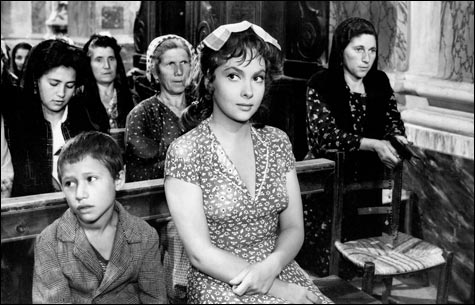
PANE, AMORE E FANTASIA: Gina Lollobrigida as a poor girl who falls for one of the local carabinieri instead of Vittorio De Sica. |
A group of performers — especially one unified by gender and culture — is an unconventional focus for a film series. But it isn’t just the topic that distinguishes the month-long “Signore & Signore: Leading Ladies of Italian Cinema 1941–1977,” which begins this Friday at the MFA. This collection includes only a handful of movies that Boston aficionados are likely to have heard of, let alone seen. Most of the entries are obscure, and these handsome prints are in most cases the first seen publicly in this country in decades. It’s an exciting series — and not just because it showcases a wide variety of acting styles and a breathtaking array of beautiful women who mesmerized the cameras at Cinecittà, Rome’s signature studio: Sophia Loren, Gina Lollobrigida, Ornella Muti, Lucia Bosè, Mariangela Melato, Claudia Cardinale, Silvana Mangano. Now any festival that includes Anna Magnani, Alida Valli, Monica Vitti, and Stefania Sandrelli — four movie stars who are also superlative actresses — justifies itself as a tribute to Italian leading ladies. But “Signore & Signore” is finally less about acting than about the lesser-known glories of the Italian cinema in its heyday. None of the Neo-Realist classics is here; there’s no Rossellini, and the contributions by Visconti and Antonioni are atypical of their respective œuvres. Yet the selection is rich and laden with surprises.
Take DRAMMA DELLA GELOSIA|A DRAMA OF JEALOUSY (September 6 at 2:30 pm; September 7 at 8 pm). Ettore Scola’s 1970 tragicomedy, featuring Vitti, Marcello Mastroianni, and Giancarlo Giannini as the shifting points in an amorous triangle, suggests a comic opera by Puccini, presented in a fragmented flashback structure with the uncharacteristically hilarious use of Brechtian devices. Scola never made anything else like it; I’m not sure anyone has. It begins with an act of violence — alluded to obliquely but not actually seen until the very end — and then marches back through the turbulent emotional tangle that led inevitably to it. Scola rarely pins down any scene to a single tone: the clowning of the three actors — especially Mastroianni and Vitti, whose performances ought to be legendary — is heartbreaking. Filmmaking was so experimental in 1970 that the stylistic accomplishments of this picture were overlooked. Now, you watch it and can hardly believe there was a time when a second-tier Italian director would have dared to put together a romantic comedy in so unorthodox a fashion. If there’s such a thing as pointillist narrative filmmaking, Dramma della gelosia is an example.
Or take LA RAGAZZA CON LA VALIGIA|THE GIRL WITH A SUITCASE (August 31 at 8:15 pm; September 6 at 12:30 pm), a poignant 1960 coming-of-age film by Valerio Zurlini that touches intimately, but not explicitly, on issues of class. Cardinale is a band singer picked up by a rich boy; he promises her an inroad to a recording contract, then abandons her, leaving his 16-year-old brother (a remarkably sensitive performance by Jacques Perrin, more celebrated these days as the director of Winged Migration) to cover for him. But the boy, ashamed of his brother’s behavior, feels responsible for her. Then he falls in love with her. Their not quite love affair is one of the most complex and nuanced treatments of intergenerational sexual attraction the movies have ever depicted; it demands comparison with such classics in the genre as Claude Autant-Lara’s Le Diable au corps|Devil in the Flesh and Alexander Singer’s A Cold Wind in August.